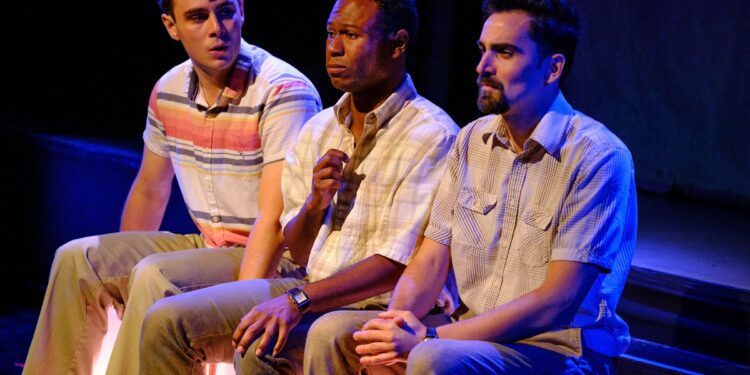A Cahoots Theatre Production
Sometimes in the ‘Ordinary’, we find the ‘Extraordinary’. Such is the case with this premiere of ‘Three Ordinary Men’
As I exited The Theatre Centre opening night, I felt tears welling in my eyes in thinking further about playwright Steven Elliott Jackson’s extremely moving premiere of ‘Three Ordinary Men’.
From a quick bit of online research, the film ‘Mississippi Burning’ is loosely based on the murders of three men and the FBI investigation. I’ve never seen this film, but now that I’ve experienced Jackson’s script, I will give the film a look.
Directed with tremendous respect and extraordinary dignity by Cahoots’ Artistic Director Tanisha Taitt, ‘Three Ordinary Men’ remains a sobering tale of Michael Schwerner (Tristan Claxton), James Chaney (Jamar Adams-Thompson) and Andrew Goodman (Jack Copland). They were abducted and murdered in Mississippi in June 1964 during the Civil Rights Movement. These men were working with the Freedom Summer campaign by attempting to register African Americans in Mississippi to vote as Blacks in the state had been restricted from voting since the turn of the century due to barriers to voter registration and other laws.
When I interviewed playwright Jackson a few weeks ago about his script, he commented his research detailed a horrible time in the aftermath of the murders. He wanted to know more about who these men were and what made them want to change the world in the way they were doing it. Thankfully, some humourous moments relieve the building plot intensity, but ‘Three Ordinary Men’ is not a proverbial comedy at all. Instead, much like some Shakespearean tragedies, Jackson prepares us for the inevitable that is going to occur since we know these men are moving towards their death.
Jackson asks a good question:
“Do we have that same kind of energy now that these characters exude in the play?”
I will answer this at the end.
The first thing that stood out to me was Tanisha Taitt’s simplistic set design which created a vivid picture in my mind of this area of Mississippi. There is a sunken floor on which four boxes illuminate lights throughout the production. One box is situated upstage right, two boxes are up from centre stage and one box is stage left. On the back wall is a torn scrim on which appears the burning of a church which ultimately burns to ashes before our eyes during the preshow. This image of the burning church is of importance to the events within the story. There is a closed captioning screen on stage right with the dialogue on display for audience members who require it.
Christopher-Elizabeth’s pre-show soundscape is highly appropriate. Thankfully it’s not overpowering but it made me pay careful attention as to what I was hearing in a range from spiritual songs to fire burning to the sound of crowds. As the production moves forward, the sound design remained clearly sharp. At one point, the sound of a car being forcefully bumped from behind which made me jump in my chair since I had just experienced a car accident a few weeks ago of the same nature.
Shawn Henry’s Projection Designs are grim reminders of the racial tensions. I was five years of age during this time, but Henry’s projections still make me think about just how horrendously awful this time and era were and as Taitt so aptly states in the Programme Director’s Note: “It is a terrifying, gut-wrenching prospect.” Claudia Tam’s costumes nicely reflected the mid-60s era as the short-sleeved t-shirts the men wore were reminders of the literal and figurative heat of the day and the time.
The performances remain consistently strong as Messrs. Claxton, Adams-Thompson and Copland solidly and emotionally demonstrated what it means to work as a true ensemble. There were moments when I sat forward in my chair as I was riveted by the engrossing plot unfolding in front of me. A quick look around at other audience members and I noticed several of them were doing the exact same thing as I did. There are some excellent monologues delivered so movingly. If actors are looking to update their repertoire of monologues for future auditions, I would strongly recommend looking at Jackson’s script.
On a side note here, I wanted to acknowledge how much justice Jackson has paid to this story and these three characters. In that same vein, I also wanted to pay justice at one point to something mentioned in the script regarding Harper Lee’s ‘To Kill A Mockingbird’. At one point, the character Tom Robinson is accused of rape by a young woman. Jackson’s script refers to the character of Luella whereas, in Miss Lee’s novel, the character’s name is Mayella. I’m sure this will be changed in future revisions. Since I’ve taught the novel to young people for over 30 years, I wanted to make sure that point of reference is fixed.
As the ‘leader’ of the trio on account of his ‘goatee’ (you’ll understand the connection in seeing the story), Tristan Claxton’s Michael Schwerner commands the stage confidently when he enters at the top of the show and begins his story of how everything began. Jamar Adams-Thompson’s James Chaney assuredly becomes that voice of rational and clear-headed thinking initially, but I’m going to try not to spoil the conclusion. Jamar’s work in that final scene remains powerfully grounded and honestly realistic. As the youngest of the trio who also receives some of the teasing and ribbing from Michael and James, Jack Copland believably and heartfully responds to the stark reality of Andrew Goodman in recognizing how dangerous this situation truly is.
Final Comments: Once again, Tanisha Taitt makes another comment in the Programme that I find interesting: ‘This story reminds us that there are those who will walk into the lion’s den for another, and those who reside there permanently.” In a historical literary sense, his theme is familiar to Robert Bolt’s ‘A Man for All Seasons’, a play I used to like teaching to high school students. Although Sir Thomas More was not certainly an ordinary man as he enjoyed favour with King Henry VIII, More too walked into the lion’s den and resided there permanently as he would not place his sovereign king before the rule of God. For this belief, More was assassinated and became a martyr.
Going back to Jackson’s question I posted earlier if we have that same kind of energy now that Schwerner, Chaney and Goodman exude in the play.
As a practicing Catholic, I do believe so.
Seven days ago, 40 people were killed and 61 injured in a Catholic Church massacre by a possible suspect insurgent group The Islamic State West Africa Province (ISWAP). Those murdered and injured walked into the lion’s den and were in the presence of God when they lost their lives.
Jackson hoped he did justice to the story of these ‘Three Ordinary Men’ because he avows this is what they deserve.
Jackson has dutifully succeeded.
‘Three Ordinary Men’ is one not to be missed.
Running Time: approximately 70 minutes.
Covid protocols are in effect at the theatre as of the publication of this article. I felt very safe and comfortable in the auditorium.
‘Three Ordinary Men’ runs to June 26, 2022, in The Incubator at The Theatre Centre, 1115 Queen Street West, Toronto. Tickets are available @theatrecentre.org or call the Box Office 416-538-0988.
THREE ORDINARY MEN by Steven Elliott Jackson
Producer: Lisa Alves
Production Manager: Maya Royer
Lighting & Projection Designer: Shawn Henry
Sound Designer: Christopher-Elizabeth
Costume & Prop Designer: Claudia Tam
Stage Manager: Lily Chan
Lighting & Projection Assistant: Michael Fillier
Dramaturge/Set Design: Tanisha Taitt
Intern Producer: Tiffany Ledesma
Captions Operator: Caitlin Farley
Production Assistant: Jillian Cooper
Performers: Jamar Adams-Thompson, Tristan Claxton, Jack Copland
Director: Tanisha Taitt
















